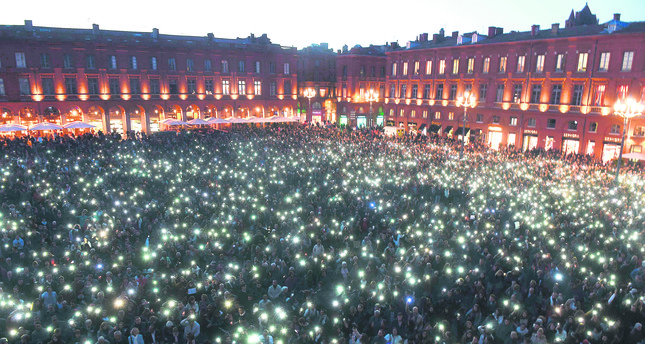In the aftermath of the Paris terrorist attacks, politicians have taken to the airwaves to shape public opinion and insert a heavy dose of Islamophobia and “clash of civilizations” venom. Florida Senator Mario Rubio called the attacks “a wake-up call” and urged the U.S. to commit itself to “a civilizational war against radical Islam.” Former Governor Jeb Bush wanted to outdo his understudy, Rubio, by declaring, “This is an organized effort to destroy Western civilization, and we need to lead in this regard.” The moral and ethical low-grounds were claimed by none other than Texas Senator Ted Cruz who called for altering the rules of military engagement in such a way as to “not be deterred by targeted air strikes with zero tolerance for civilian casualties when the terrorists have such utter disregard for innocent life.” Defending civilization by killing civilians should be Cruz’s presidential motto!
For his part, Donald Trump attacked Barack Obama’s Middle East policy, calling it “weak” and suggesting to an audience that he has “instincts” for terrorism in the same way that he has a good instinct for “a good location” in real estate deals. Critically, Trump emphasized his readiness to close down U.S. mosques and urged security institutions “to watch and study the mosques because a lot of talk is going on at the mosques.” In France, Marie Le Pen wrote on Twitter: “For the sixth time in 2015, Islamic terrorism has hit our country,” and “French people are crying for the dead, and I cry with them.”
What is clear from the Republican candidates in the U.S. and Le Pen in France is that the extreme right wing wasted no time in attempting to ride another terrorism tragedy into the ballot boxes. The right wing immediately shifted away from the heinous crimes committed by terrorists into a debate about Syrian refugees, immigration, the Iran deal and Muslims in Western society, thus adding insult to injury following the attacks. Real questions must be asked and appropriate measures taken to address terrorism holistically instead of creating electioneering sound bites.
The unequivocal point to be made first is that Muslims are the primary victims of terrorism and counterterrorism efforts. Terrorists kill Muslims so as to force them to adhere to their distorted worldview, and likewise, when Western states and their allies undertake military reprisals, Muslim civilians are the primary victims. While we should mourn every human life equally, however, in reality we rarely stop to mourn, humanize and put a face and name to Muslim and Arab victims of terrorism and counterterrorism efforts.
Terrorism is a tactic that has no religious identity. The constant proclivity of civilizational warriors on both sides to clothe the tactic in religious garb does a disservice to efforts at countering or addressing the problem of terrorism. A terrorist claim of defending Islam gets mileage when Cruz, Trump and Le Pen place the “Islamic” adjective on that which is criminal and heinous. Inserting “Islamic” or “Islam” in the debate shifts away from the criminal terrorist as an individual and moves the focus instead to his/her faith and community (local and global) as the “real” problem. Precisely, this shift is the cause that makes it possible on the one hand for the terrorists to use it to claim a civilizational war on the West and the Islamophobes to push Muslims in Western societies to the margins because they don’t belong in the West.
The loudest voices are calling for another round of bombings and more intervention, as if the past 15 years (more like 30 years) have not established the limitations and futility of this approach. The same neo-conservatives and their allies will not concede failure and will bomb their way into Armageddon before admitting that their invasion of Iraq was the decisive factor in the ongoing chaos. In addition, no one in the U.S., Europe or the Gulf will take responsibility for the Frankenstein laboratory that developed the jihadi platoons in Afghanistan and unleashed them on the Russians in the 1980s.
More intervention, bombing raids and drones will not resolve this problem. In the absence of a real political, economic, social and educational project in the region, terrorism becomes the instrument through which regional actors, with support from global allies, settle their disputes.
If war is politics by other means, then terrorism is politics by choice deployed by regional and global actors to prevent real change and alternatives from emerging. In reality, terrorism flourishes when politics runs into a wall. Look at the list: Iraq, Syria, Egypt, Libya, Yemen, Afghanistan, Israel, Mali, Central African Republic, Chechnya, Pakistan, Somalia, Myanmar, Nigeria, and Ukraine all have run into dead ends where violence has become the only politics.
Reducing terrorism to mere religious identity markers frames the problem wrongly and is driven by electioneering politics. It is easy to have a candlelight vigil, but much more difficult to ask about the policies that brought the world to this point. Who supplied these groups with weapons and ammunition? Why continue to sell weapons in a region soaked in blood? And who benefits from propping up and rewarding undemocratic regimes that have sent more of their young populations to DAESH than to universities?


